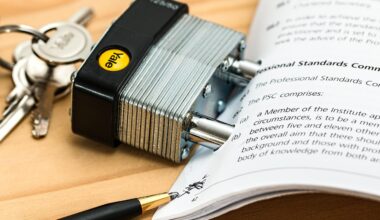Cross-Channel Event Marketing Automation: Best Practices
In today’s digital landscape, event marketing automation plays a pivotal role in engaging audiences across multiple channels. Marketing automation tools help businesses streamline their event processes, from planning to execution. Event marketing automation encompasses not only emails but also text messages, social media, and targeted advertisements. By integrating various platforms, marketers can enhance communication and provide a seamless experience for attendees. Segmenting audiences based on interests, purchasing behavior, and demographics is essential. Personalization of messages increases engagement, ultimately driving conversion rates. Automation allows for scheduling communications ahead of time, enabling timely reminders, updates, and promotional messages customized for each audience segment. Moreover, tracking analytics is crucial for measuring the effectiveness of campaign strategies. Utilizing A/B testing to determine which messages resonate with the audience can refine future campaigns. With numerous tools available, businesses should select platforms that offer comprehensive analytics, customizable templates, and user-friendly interfaces. Embracing these technologies not only saves time and effort but significantly amplifies the reach and impact of marketing efforts. Implementing consistent branding across all channels ensures a cohesive message is delivered, reinforcing brand identity.
One of the key aspects of successful event marketing automation is building a targeted email list. This list should comprise individuals who have expressed interest in your events or related content. To grow this list, businesses can employ various strategies, including landing pages, social media campaigns, and offering valuable resources. When visitors cannot find ease, they may leave your site without signing up. Hence, it’s crucial to create eye-catching, user-friendly sign-up forms. Once a list is established, it is vital to maintain its relevance. Regularly cleaning out unresponsive subscribers helps ensure higher open rates and better engagement. Combining email marketing with social media enhances visibility, allowing organizations to reach potential attendees where they spend most of their time. The use of engaging visuals and compelling content in emails will grab attention and persuade readers to engage with your events. Automated systems can send follow-up emails to nurture relationships with registrants. With every step of the funnel being automated, it reduces manual work, and systems can gather insights to improve future events. By streamlining this process, companies can focus their resources on creating memorable event experiences.
Incorporating event landing pages is another best practice that maximizes your marketing automation strategy. An effective landing page should provide essential information about the event while encouraging registrations. This page must be visually appealing, easy to navigate, and optimized for mobile devices to accommodate all users. Including persuasive content that outlines the event’s value proposition is essential. Utilize engaging visuals and testimonials from past attendees to build credibility. A unified message across all marketing channels leading to the landing page strengthens trust and enhances conversion rates. Including countdown timers to create urgency can prompt potential attendees to make quick decisions. Utilizing strong calls to action (CTAs) will guide users to register easily. Integrating social sharing options can encourage attendees to share the event with their networks, further expanding reach. Tracking the performance of landing pages through analytics enables your organization to make data-driven adjustments over time. Continuous optimization of these pages based on user behavior will enhance engagement and conversion rates. These practices ensure that your event marketing strategy not only attracts participants but also delivers valuable insights for future campaigns.
Integrating Social Media with Event Marketing Automation
Social media has become an indispensable element of event marketing. By leveraging automation, businesses can streamline their social media posts, ensuring consistency and timely communication. Automated tools allow businesses to schedule posts in advance across various platforms. Engaging potential attendees through social media conversations contributes to building anticipation surrounding an event. Regularly updating followers with relevant information, such as speaker announcements, agendas, and interactive content, keeps your brand top of mind. A multi-channel approach facilitates wider reach and engagement. Using dedicated hashtags can foster community and conversations while promoting brand visibility. Encourage attendees to share their experiences live during events to increase organic reach and engagement. Many marketing automation platforms offer integration with social media channels, enabling streamlined communication. Lastly, collecting feedback on social platforms post-event provides invaluable insights to enhance future events. Responding to participants’ comments shows that your brand values its audience’s opinions. This two-way interaction builds stronger relationships and encourages loyalty. Utilizing social media as part of your event marketing automation ensures a vibrant and engaged community before, during, and after events.
Event follow-up automation is critical for sustaining engagement after the event concludes. It is essential to maintain momentum by continuing communication with attendees. Automated follow-up emails can express gratitude and gather feedback regarding their experiences. These messages can include surveys to assess satisfaction levels and solicit suggestions for future events. Crafting tailored follow-ups based on attendee profiles will increase the likelihood of a response. Additionally, sharing event highlights, recordings, and exclusive content reinforces the value of the experience. Providing attendees with access to recorded sessions extends the event’s impact and showcases the company’s commitment to valuable interactions. Followers who engage post-event can be nurtured through targeted campaigns, including invitations to upcoming events. Keeping contacts warm within the communication funnel is key to converting prospects into loyal customers. Implementing a consistent review of follow-up metrics ensures improvements in future communications. Mapping the customer journey from initial contact throughout their lifecycle can provide insights that enhance future event planning. Automation tools can assist in capturing engagement metrics that inform and refine your overall marketing strategies.
Maximizing Engagement Through Personalization
Personalization is paramount for driving engagement in event marketing automation. Understanding attendee preferences and behaviors allows for tailored communications that resonate with target audiences. Utilizing insights gathered from previous interactions can guide segmentation strategies. By offering personalized content that aligns with each attendee’s interests, brands can create a more compelling narrative. Automated systems enable businesses to gather data and analyze patterns efficiently. Personalized invitations, reminders, and follow-ups are more likely to capture attention and encourage action. Employing dynamic content within automated emails allows for customized messaging based on user behavior. For example, if a registrant shows interest in specific sessions, follow-up emails about those topics can keep engagement levels high. Additionally, offering incentives or exclusive content to targeted groups further enhances the participant experience. Consideration of time zones and scheduling preferences is essential to enhance attendee satisfaction. Ensuring that even your automated messages feel personal fosters stronger bonds within the community. By implementing these personalization strategies, companies can build more significant connections and drive higher participation rates while enhancing overall event success.
Analytics and reporting play a critical role in measuring the success of event marketing automation efforts. With the wealth of data available, organizations can assess their campaigns’ performance across various channels. Monitoring key performance indicators (KPIs), such as open rates, registration numbers, and attendee engagement, allows marketers to make adjustments as needed. Tools that track these metrics help in understanding what strategies are effective and which areas require refinement. Utilizing visual reports to present this data to stakeholders can facilitate informed decision-making regarding future event initiatives. Implementing real-time analytics enables marketers to view performance metrics as events unfold. A/B testing different subject lines and content formats provides insight into audience preferences and behavior patterns. Post-event evaluations accelerating internal learning can inform further event strategies. Consistent data analysis across multiple campaigns allows for long-term improvements in overall marketing approaches. By embracing a culture of measurement and optimization, businesses can refine and elevate their event marketing automation strategies, ensuring greater success over time. Ultimately, the insights gained can help optimize return on investment and enhance attendee satisfaction.
In conclusion, cross-channel event marketing automation presents numerous opportunities for businesses to enhance their marketing strategies. By integrating various channels and utilizing automation tools, companies can streamline their event marketing processes for optimal efficiency. Each of the discussed best practices plays a vital role in maximizing engagement and ensuring event success. By focusing on audience targeting, personalized communication, and data-driven strategies, marketers can create memorable and valuable experiences for attendees. Moreover, leveraging feedback and analytics fosters continuous improvement within the marketing automation framework. The synergy of all these elements leads to stronger brand connections and increased loyalty among customers. As the marketing landscape becomes increasingly competitive, implementing effective event marketing automation strategies will distinguish your efforts from others. The use of technology and creativity can yield significant benefits, ultimately driving growth within organizations. To stay ahead in the ever-evolving marketing landscape, businesses must keep refining their strategies and embracing the latest trends within event marketing automation. The right combination of tools and practices ensures measurable success while creating memorable experiences tailored to audiences’ needs.


